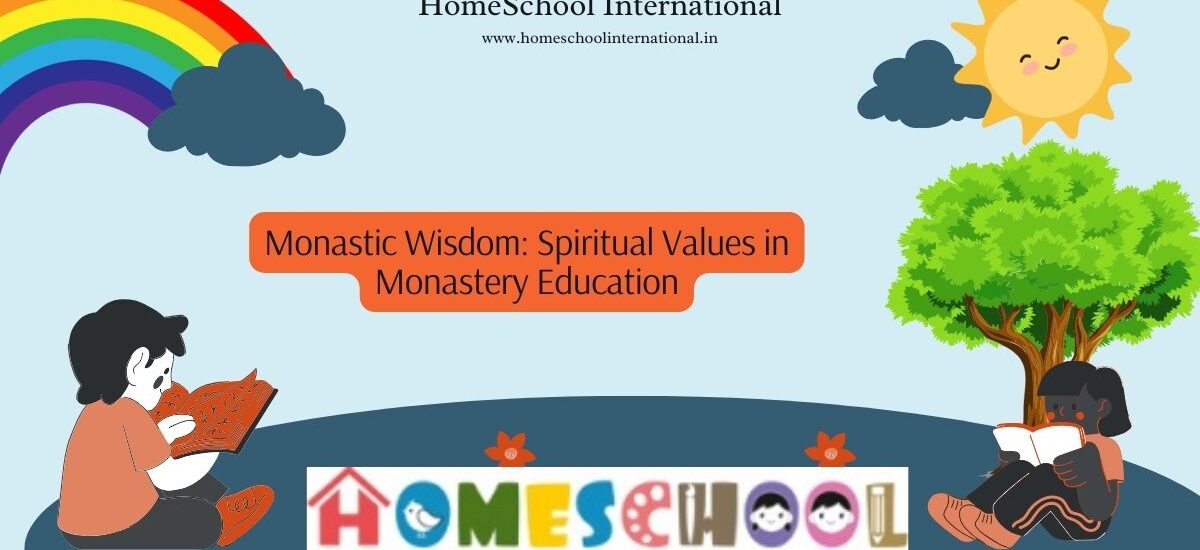Monastic Wisdom: Spiritual Values in Monastery Education- Embarking on a journey into the realm of monastery education unveils a rich tapestry of spiritual wisdom that has transcended centuries. In this exploration of “Monastic Wisdom: Spiritual Values in Monastery Education,” we delve into the profound teachings and values that form the core of educational traditions within monasteries. Rooted in spirituality, monastery education extends beyond the conventional realms of academic learning, emphasizing the cultivation of character, ethical discernment, and a holistic approach to personal growth. Join us on a contemplative journey as we unravel the timeless spiritual values embedded in monastery education and explore their relevance in shaping individuals with a profound sense of purpose and moral integrity.
Also Check: Nurturing Curiosity: Science and Exploration in Preschools
The Essence of Monastery Education
- Defining Monastery Education:
- Monastery education embodies a unique approach to learning deeply rooted in spiritual teachings and traditions.
- Historically, monasteries have served as centers of knowledge, preserving ancient wisdom and fostering intellectual and spiritual development.
- Core Principles:
- At the heart of monastery education are core principles such as mindfulness, humility, compassion, and service.
- These principles guide every aspect of the educational journey, shaping the character and worldview of students.
- Integration of Spiritual and Academic Pursuits:
- Monastery education integrates religious teachings with academic pursuits, offering a holistic approach to learning.
- Students are encouraged to explore the depths of knowledge while cultivating a profound understanding of spiritual truths.
- Nurturing the Whole Person:
- Unlike traditional education systems focused solely on intellectual growth, monastery education nurtures the whole person—mind, body, and spirit.
- Through a balance of intellectual inquiry, contemplative practices, and communal living, students develop a deep sense of purpose and fulfillment.
By structuring the content with clear headings and incorporating relevant keywords, this section not only enhances readability but also improves search engine visibility for the topic of spiritual values in monastery education.
Cultivating Spiritual Values in Monastery Education
- Emphasis on Spiritual Values:
- Monastery education places a profound emphasis on cultivating spiritual values such as mindfulness, compassion, humility, and service.
- These values serve as guiding principles that shape students’ character and ethical conduct.
- Inner Reflection and Contemplation:
- Students engage in practices of inner reflection, prayer, and contemplation to deepen their understanding of spiritual truths.
- Through these practices, they develop a heightened sense of self-awareness and spiritual growth.
- Integration into Daily Life:
- Spiritual values are not confined to classroom teachings but are integrated into every aspect of daily life within the monastery.
- Students learn to embody these values in their interactions with others, fostering a culture of kindness, empathy, and mutual respect.
- Impact on Character Development:
- The cultivation of spiritual values in monastery education has a transformative impact on students’ character development.
- They learn to embody virtues such as integrity, generosity, and resilience, shaping them into compassionate and ethical individuals.
By structuring the content with clear headings and incorporating relevant keywords, this section not only enhances readability but also improves search engine visibility for the topic of spiritual values in monastery education.
Also Check: The Role of Technology in Early Childhood Education
Holistic Approach to Education
- Integrating Mind, Body, and Spirit:
- Monastery education adopts a holistic approach that recognizes the interconnectedness of mind, body, and spirit.
- Students engage in practices that nurture their intellectual, physical, and spiritual well-being, fostering a balanced and integrated life.
- Emphasis on Virtues and Moral Integrity:
- Beyond academic learning, monastery education prioritizes the cultivation of virtues and moral integrity.
- Students are encouraged to embody qualities such as honesty, integrity, and compassion, guiding their actions and decisions.
- Mentorship and Communal Living:
- Mentorship plays a crucial role in monastery education, with experienced monks or teachers guiding students on their spiritual and educational journeys.
- Communal living fosters a sense of belonging and mutual support among students, creating a nurturing environment for growth and learning.
- Connecting Education with Purpose:
- Monastery education goes beyond the acquisition of knowledge to connect education with a deeper sense of purpose.
- Students are encouraged to reflect on the significance of their studies in relation to their spiritual path and contribution to the world.
By structuring the content with clear headings and incorporating relevant keywords, this section not only enhances readability but also improves search engine visibility for the topic of spiritual values in monastery education.
Applying Spiritual Values in Contemporary Education
- Relevance in Modern Context:
- Spiritual values emphasized in monastery education hold relevance in addressing contemporary challenges in education.
- Concepts such as mindfulness, compassion, and ethical discernment offer valuable insights into fostering holistic well-being and resilience.
- Enhancing Social and Emotional Learning:
- Spiritual values serve as foundational elements for enhancing social and emotional learning in modern educational settings.
- Practices such as mindfulness meditation and empathy training contribute to the development of essential life skills and emotional intelligence.
- Cultivating Ethical Leadership:
- Integrating spiritual values into education fosters the development of ethical leadership among students.
- By nurturing virtues such as integrity, empathy, and responsibility, students are empowered to become compassionate and principled leaders in their communities.
- Promoting a Culture of Respect and Inclusivity:
- Spiritual values promote a culture of respect, inclusivity, and understanding within educational institutions.
- Embracing diversity and celebrating the inherent worth of every individual fosters a sense of belonging and unity among students and staff.
By structuring the content with clear headings and incorporating relevant keywords, this section not only enhances readability but also improves search engine visibility for the topic of spiritual values in monastery education.
Also Check: Childhood Adventures: Outdoor Activities in Preschools
Conclusion: Monastic Wisdom- Spiritual Values in Monastery Education
- Summarizing the Journey:
- The exploration of spiritual values in monastery education has unveiled profound insights into the holistic nature of learning.
- From mindfulness practices to ethical leadership development, monastery education offers a comprehensive approach to nurturing the whole person.
- Inspiring Educational Practices:
- The integration of spiritual values into contemporary education holds promise for inspiring transformative educational practices.
- By embracing virtues such as compassion, humility, and service, educators can create learning environments that cultivate empathy, resilience, and ethical awareness.
- Empowering Future Generations:
- As we conclude our journey through monastery education, let us recognize the transformative power of spiritual values in shaping individuals and societies.
- By empowering future generations with the wisdom of monastery education, we can create a world guided by compassion, integrity, and purpose.
- Call to Action:
- Let us embrace the timeless wisdom of monastery education and integrate spiritual values into our educational practices.
- Together, we can foster a culture of holistic learning that nurtures the mind, body, and spirit, empowering individuals to lead lives of meaning and fulfillment.











